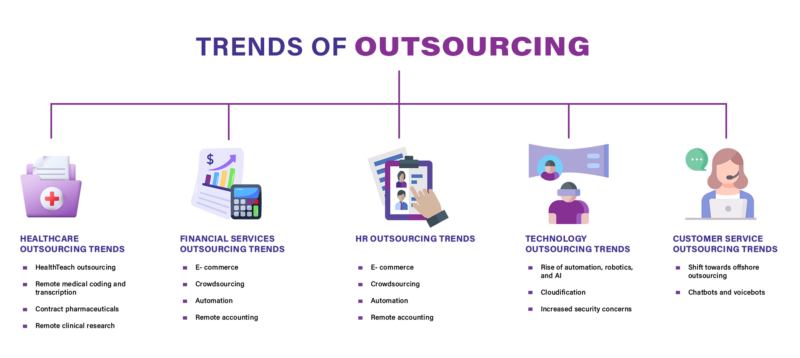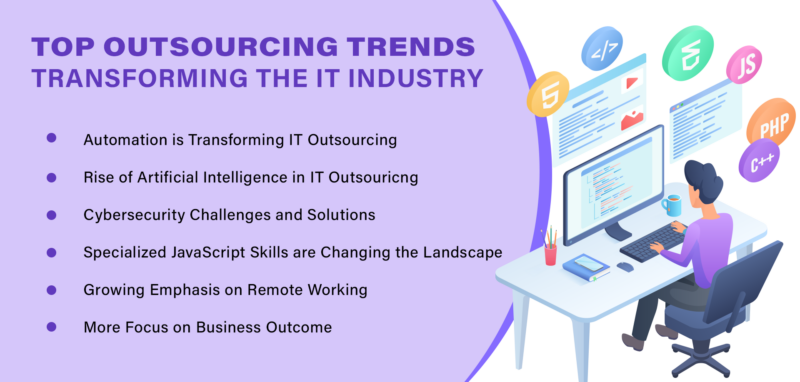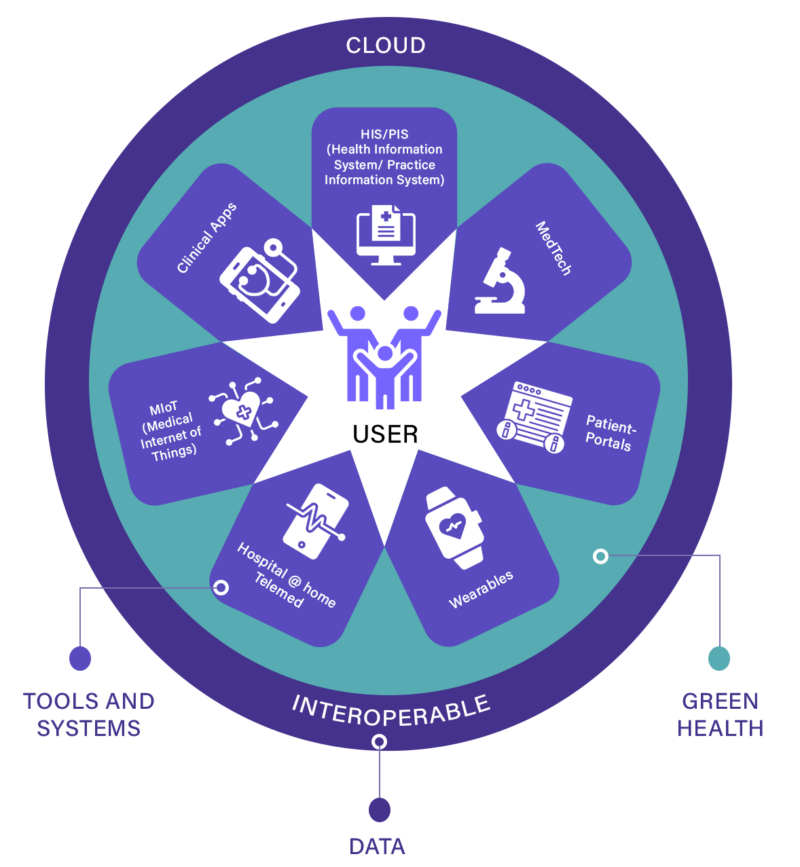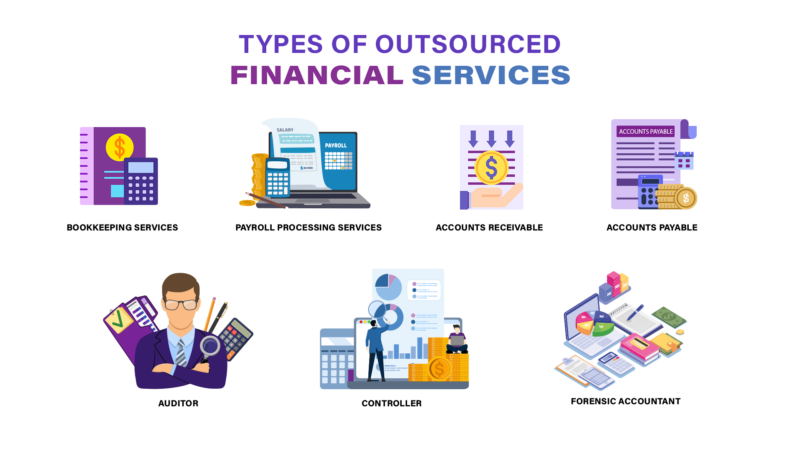Outsourcing, fundamentally the strategic practice through which businesses procure goods and services from suppliers in foreign territories, has experienced a notable surge in its adoption and application over 2023. In essence, outsourcing involves delegating certain business functions or services to external agencies or experts abroad to leverage their specialized capabilities, ultimately aiming to enhance efficiency and effectiveness within the operations of a business.
This particular composition seeks to comprehensively explore and analyze various crucial aspects associated with the burgeoning trend of outsourcing. The core objective here is to delve deeply into the factors instrumental in propelling the significant growth observed in outsourcing during 2023. The article sheds light on the benefits businesses can gain by incorporating outsourcing into their operational framework.
The Rise of Outsourcing in 2023
In 2023, outsourcing trends have indicated a significant uptrend due to its multiple business advantages, with business process outsourcing witnessing a notable surge in popularity. Statistical data has documented a marked increase in outsourcing across diverse sectors, including Information Technology (IT), healthcare, manufacturing, and financial services. These sectors are predominantly leading in engaging outsourcing companies.
The escalating trend is primarily driven by businesses’ need to reduce costs, obtain access to specialized skills, and concentrate on their core operations, all vital advantages of outsourcing services.
Benefits of Outsourcing
Cost-Efficiency
The outsourcing industry presents an economical option primarily as it significantly reduces labor and operational expenses. At the same time, it ensures that productivity levels are meticulously maintained. This cost-effectiveness within the outsourcing market makes it an attractive choice for many businesses.
By engaging outsourcing providers’ services, companies save money and enhance their outsourcing efforts, ultimately streamlining operations and preserving the efficiency and output of their workforce.
Focus on Core Business Operations
When they embrace outsourcing, businesses can focus primarily on strategic and crucial areas central to their operations and overall objectives. By delegating non-core functions, which are essential but not strategically critical tasks, to experienced third-party service providers, companies can ensure that these necessary operations are managed efficiently and effectively without diverting their attention from their core competencies and strategic initiatives.
This approach enables organizations to focus on areas that are pivotal for their growth and success while ensuring that all facets of the business are attended to with a high level of expertise and precision.
Furthermore, by outsourcing non-core functions, firms can streamline their operational structure, enhance flexibility, and respond more adeptly to the dynamic and ever-evolving business environment.
Global Talent Access
Engaging in outsourcing practices actively opens doors for companies to a global reservoir of talent, presenting access to individuals possessing a high level of expertise and an array of specialized skills crucial for specific tasks and projects. This approach allows businesses to tap into the international market, where various professionals offer different skills and knowledge that might not be readily available or are scarce in the domestic talent landscape. With the world as their resource, companies can select and collaborate with experts whose skills perfectly align with the requirements and expectations of the job, thereby ensuring a quality of work that meets, if not exceeds, industry standards.
This global approach to sourcing talent brings fresh perspectives and ideas. It fosters an environment of diversity and innovation, imperative for businesses aiming to stay competitive and relevant in today’s fast-paced and constantly changing market.
Flexibility and Scalability
Companies engaging in business practices today have the advantage of effortlessly adapting to the fluctuating demands presented by the marketplace without bearing the strenuous and often financially cumbersome process of recruiting or terminating employees.
This adaptability is crucial in responding to the dynamic market conditions and consumer preferences that often shift without notice. By not navigating through the complex and sensitive procedures of hiring new staff or letting go of existing ones, organizations can maintain a stable and focused workforce that isn’t constantly in flux due to market demands.
Furthermore, this approach minimizes potential legal issues, administrative burdens, and the financial costs associated with employee turnover, providing businesses with more room to maneuver and respond to market changes swiftly and efficiently.
Industry-wise Adoption

IT Industry

In pursuing specialized skills and ensuring the provision of support services around the clock, organizations increasingly lean towards outsourcing as a feasible strategy. Outsourcing has become a prevalent approach, particularly in software development, with the trend gaining traction as companies acknowledge and seek expertise outside their immediate geographical and operational confines.
The current software development outsourcing trends indicate a growing affinity towards incorporating sophisticated technologies and methodologies, such as robotic process automation (RPA) and artificial intelligence (AI).
These cutting-edge technologies are imperative for businesses aiming to stay ahead in the competitive landscape, fostering efficiency and innovation and delivering unrivaled services to clients and customers.
Outsourcing software development, therefore, is not merely a tactic to cut costs; it is a strategic move designed to infuse the organization with unparalleled technical understanding and capabilities. When businesses outsource software development, they inherently subscribe to a model that offers them a continuous, 24/7 support framework critical in addressing and resolving issues in real-time, ensuring that operations run smoothly and efficiently.
Furthermore, observing the broader canvas of technology outsourcing trends, it is clear that the focus is gradually shifting towards adopting and leveraging advanced tech solutions. The integration of artificial intelligence within outsourced services, for instance, is no longer a futuristic concept but a present-day reality, aiding in streamlining processes, enhancing accuracy, and delivering efficient, innovative, and responsive services to the changing market demands and dynamics.
Healthcare
The delegation of administrative responsibilities and the management of sensitive data through outsourcing, notably within the realm of BPO outsourcing trends, provides healthcare professionals with the invaluable opportunity to channel their attention and resources more intently toward delivering superior patient care. With the outsourcing trends of 2023 indicating a substantial increase in reliance on external providers for non-core tasks, this practice has become integral for organizations aiming to optimize their primary functions effectively.

In particular, human resource (HR) tasks, often administrative, are increasingly being outsourced, as evidenced by the current HR outsourcing trends. These trends highlight a growing preference among organizations to hand over their HR functions to specialized external service providers, freeing internal staff to concentrate on more strategic, patient-centered roles without being burdened by the time-consuming administrative duties that HR demands.
Software outsourcing also plays a pivotal role in this scenario, where data management, especially when dealing with sensitive data, needs meticulous handling and advanced tools and technology for secure and efficient processing. Outsourcing firms specializing in software have the requisite technology and expertise to manage sensitive data with the utmost integrity and security, ensuring that the information remains confidential and protected.
Moreover, the cost savings associated with outsourcing are non-trivial and contribute significantly to the organization’s financial health. By transferring administrative and data management responsibilities to third parties, institutions can realize substantial savings, reducing operational expenditure and allowing them to invest more in improving the quality of patient care and other core functions. Consequently, with reduced financial burdens and administrative responsibilities, healthcare professionals can dedicate their skills and time to providing attentive, high-quality patient care.
Manufacturing
Organizations are adopting strategic measures to tap into the expansive global markets and concurrently achieve a reduction in production costs. Engaging in these practices allows firms to extend their reach to international consumer bases, thus ensuring a presence in various lucrative markets around the globe.
Additionally, this approach aids in substantially decreasing expenses associated with the production process, fostering a more cost-effective and economically efficient operational environment. Through this dual-faceted strategy, companies can broaden their market access and streamline their production mechanisms to be more financially prudent and sustainable in the long run.
Financial Services
Organizations are adopting strategic initiatives to achieve improved risk management and steadfast adherence to compliance protocols. These enhanced measures are designed to meticulously navigate through various business risks while steadfastly maintaining alignment with established compliance standards and regulatory requirements.

By doing so, companies fortify their risk management strategies and ensure a more rigorous and consistent observance of necessary compliance measures, thereby creating a more secure and compliant operational framework. This, in turn, fosters an environment wherein businesses can operate more confidently and efficiently, with minimized risk and enhanced regulatory conformity.
Risks and Challenges
However, outsourcing has challenges, including loss of control, quality concerns, data security, and potential communication and cultural issues. Addressing these risks necessitates meticulous planning and robust strategies.
Mitigating Risks in Outsourcing
Vendor Management
Creating and nurturing robust relationships with vendors and formulating clear and unmistakable contracts play a pivotal role in mitigating risks associated with external partnerships and transactions. This process involves fostering a deep understanding and mutual trust between the involved parties, ensuring that both the vendor and the client are aligned in their expectations and commitments.
By crafting contracts with clarity and precision, misunderstandings and ambiguities are effectively minimized, providing a solid foundation for a cooperative and harmonious working relationship that inherently reduces the potential for conflicts and disputes.
Quality Control
The deployment of stringent and meticulous quality checks is a vital step that guarantees the output generated not only aligns with but also meets the predetermined and expected quality standards set by the organization or industry. By systematically applying these rigorous checks at various stages of the production or service delivery process, firms can actively monitor, assess, and verify the caliber of their offerings.
This proactive approach to quality assurance is instrumental in identifying discrepancies or deviations from the set benchmarks early in the process, allowing for timely corrections and adjustments.
Data Protection
Ensuring strict compliance with international data protection regulations is paramount in today’s business environment, particularly with the growing demand for robust systems that safeguard against data breaches. This need is crucial as businesses process and handle vast amounts of sensitive data that require utmost protection. Adherence to these stringent international standards not only serves to protect sensitive data effectively but also fortifies business processes against potential threats and vulnerabilities.
In a global market increasingly influenced by technologies like augmented reality, where data exchange is constant and multifaceted, maintaining compliance is not merely a legal imperative but also a fundamental prerequisite for securing consumer trust and ensuring the integrity and confidentiality of data within the intricate web of digital interactions.
Clear Communication
Crafting and implementing well-thought-out communication strategies is instrumental in bridging the often formidable gaps presented by cultural and language differences in a globalized business landscape. These comprehensive strategies encompass a range of practices and tools designed to facilitate clear and effective communication across diverse cultural and linguistic backgrounds. By doing so, they not only ease the flow of information but also foster understanding and collaboration among team members, partners, and stakeholders from various parts of the world.
The Future of Outsourcing: What to Expect
With technology continually evolving, outsourcing is expected to undergo transformative changes. The rise of remote work, advancements in automation and AI, and the need for agile business practices post-COVID-19 will further propel outsourcing as a strategic business move.
All In All
In the unfolding business landscape of 2023, outsourcing persistently accrues momentum, establishing itself more firmly as a viable and strategically imperative business practice for organizations aiming at both efficiency and growth. This approach provides a treasure trove of benefits to businesses, catalyzing operational efficiency and providing a platform for accessing global talent pools.
However, it’s imperative to acknowledge and meticulously navigate through the potential risks that are inherently intertwined with the process of outsourcing.
For companies to truly harness the full spectrum of advantages of outsourcing, they must engage in careful and strategic planning. This involves crafting well-defined outsourcing strategies, implementing robust risk mitigation protocols, and continuously updating their knowledge and understanding of the most recent trends and best practices in the outsourcing domain.
By staying abreast of the emerging trends and insights, businesses position themselves proactively, ready to adapt and capitalize on the evolving opportunities in the outsourcing arena.



Leave A Comment
You must be logged in to post a comment.